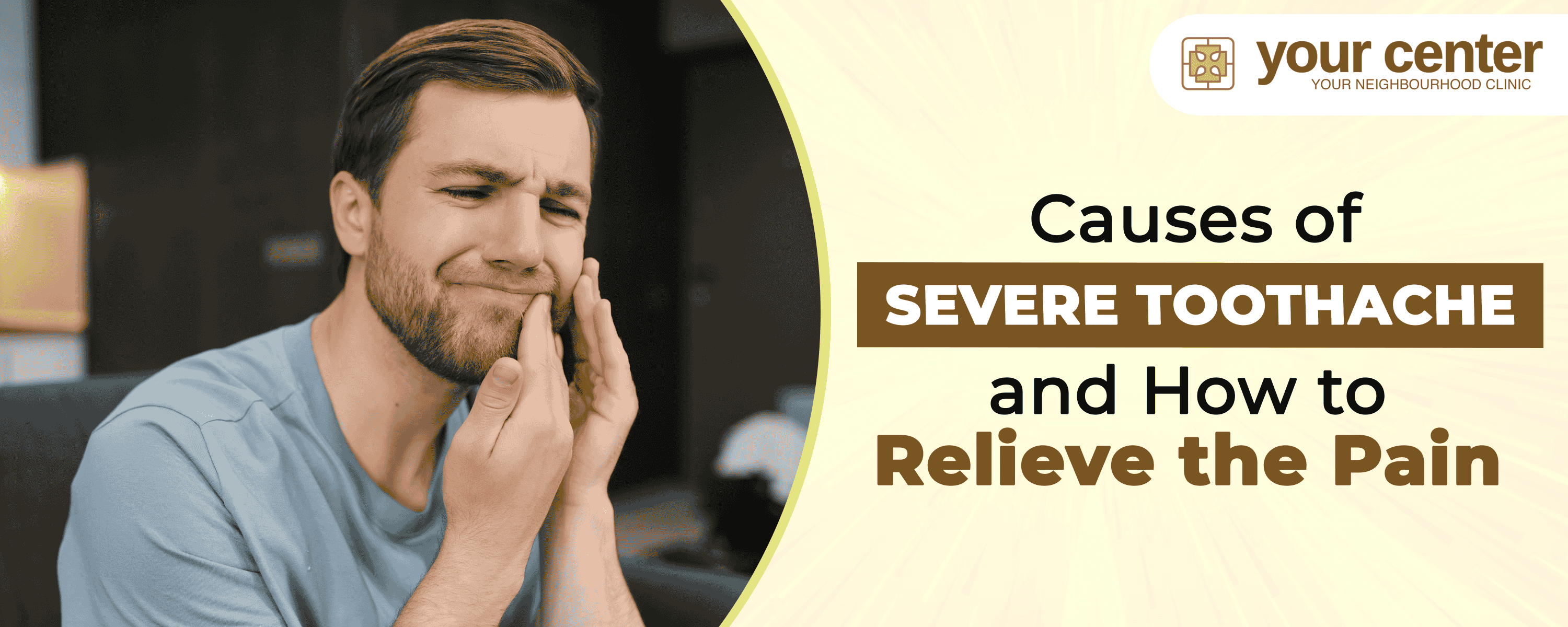
Causes of Severe Toothache and How to Relieve the Pain
A severe toothache can be one of the most unbearable types of pain that makes everything difficult, whether the individual wants to eat, sleep, or even concentrate in their work or study. It’s a sudden toothache and jaw pain or a lingering ache; that’s why understanding the root cause can help you find the right toothache relief.
In this blog, we’ll discuss the common causes of severe tooth pain and the best ways to relieve it.
Common Causes of Severe Toothache
1. Cavities (Tooth Decay)
One of the most common reasons for unbearable tooth pain is untreated cavities.
Decay erodes the enamel, exposing the sensitive nerves inside the tooth.
Pain can be sharp or constant, worsening when consuming hot, cold, or sweet foods.
2. Gum Infections (Gingivitis & Periodontitis)
Inflamed gums due to bacterial infections can cause toothache and jaw pain.
Bleeding, swelling, and bad breath are often found together in gum disease.
If untreated, the infection can spread to the bone and nerves, leading to severe pain.
3. Abscessed Tooth (Pus Buildup)
An abscess is a painful pocket of pus caused by an infection.
Symptoms include throbbing pain, fever, and swelling in the jaw or face.
An abscess can spread to other parts of the body if not treated immediately.
4. Cracked or Fractured Tooth
A broken tooth exposes the nerves, making it sensitive to temperature and pressure.
Cracks may be invisible, but the pain can be intense, especially when chewing.
Biting on hard foods or trauma can cause sudden and severe toothache.
5. Sinus Infections (Tooth Pain from Sinuses)
Sinus congestion or infection can cause tooth pain in the upper jaw.
The pressure from inflamed sinuses pushes on the nerves of your teeth.
Sinus-related tooth pain is often accompanied by nasal congestion and headaches.
6. Wisdom Teeth Problems
Impacted or partially erupted wisdom teeth can cause sudden jaw pain and toothache.
Pain can spread to nearby teeth and cause gum swelling or infection.
In some cases, wisdom tooth extraction is needed to relieve the pain.
7. Teeth Grinding (Bruxism)
Grinding or clenching your teeth can cause tooth sensitivity and jaw pain.
This habit often occurs during sleep, leading to worn-out enamel and nerve exposure.
Over time, bruxism can cause fractures and chronic discomfort.
8. Damaged Fillings or Dental Work
Old or loose fillings, crowns, or bridges can expose the nerves, leading to pain.
A damaged filling can allow bacteria to enter the tooth, causing decay underneath.
If left untreated, it can result in an abscess or severe tooth infection.
Related: Common Dental Issues.
Why Does Tooth Pain Come and Go?
Some types of toothache, like sensitivity or mild decay, can cause occasional pain.
Changes in temperature (hot/cold food) or pressure (chewing) can trigger temporary discomfort.
Nerve-related pain may come and go but worsen over time if untreated.
If the pain persists or intensifies, a dental checkup is necessary.
How Do You Stop Intenseful Tooth Pain?
When tooth pain strikes, you need quick relief before seeing a dentist. Here’s how to treat unbearable tooth pain at home:
1. Rinse with Warm Salt Water
Helps reduce swelling and kill bacteria.
Mix 1 teaspoon of salt in a glass of warm water and rinse for 30 seconds.
2. Apply a Cold Compress
Numbs the area and reduces inflammation.
Wrap ice in a cloth and apply it to the cheek near the aching tooth for 15 minutes.
3. Take Over-the-Counter Pain Relievers
Medications like ibuprofen or acetaminophen can help with toothache relief.
Avoid aspirin if the pain is due to bleeding gums.
4. Use Clove Oil for Natural Pain Relief
Clove oil has natural antibacterial and numbing properties.
Apply a small amount to a cotton ball and press it against the painful tooth.
5. Avoid Hard, Cold, or Sugary Foods
Certain foods can trigger or worsen tooth pain.
Stick to soft foods until you see a dentist.
6. Try Chlorhexidine Rinse
Helps kill bacteria and reduce infection-related pain.
Mix equal parts 3% chlorhexidine and water, swish, and spit.
7. Elevate Your Head While Sleeping
Keeps blood from rushing to the head, reducing pressure and swelling.
Use an extra pillow to minimize discomfort at night.
When to See a Dentist?
While home remedies can provide temporary relief, some signs require urgent dental care:
Severe, throbbing pain that lasts for hours
Swollen gums, face, or jaw
Fever or difficulty swallowing
Pain that spreads to the ear or neck
Pus or foul taste in the mouth
Ignoring severe tooth pain can lead to complications like abscess formation, nerve damage, or tooth loss.
Final Thoughts
A sudden toothache and jaw pain can be distressing, but identifying the cause can help you find the right treatment. Tooth decay, infections, cracked teeth, or sinus issues are common culprits of severe pain.
For toothache relief, try home remedies like cold compresses, rinses, and pain relievers. However, if the pain is persistent or unbearable, feel free to schedule a dental visit at Your Center Polyclinic (the best polyclinic in Dubai) for better guidance and proper care.






